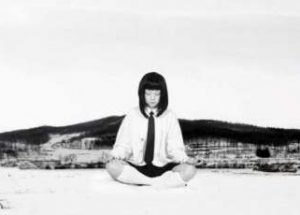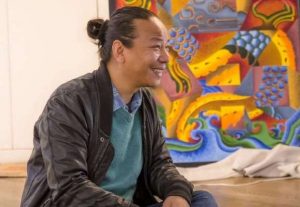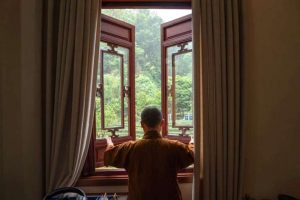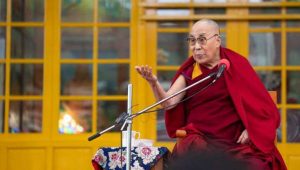
The influential Buddhist monk and teacher Venerable Hsing Yun, the founding patriarch of the Fo Guang Shan Buddhist order and the Buddha’s Light International Association in Taiwan, and a leading figure in the Humanistic Buddhism movement, has died in Taiwan. According to an official announcement of his passing, Ven. Hsing Yun passed away on Sunday at 5pm local time. He was 97 years old.
The Fo Guang Shan-affiliated news outlet The Merit Times reported that a formal announcement was made by Ven. Hsin Bau, chairperson of the Fo Guang Shan Board of Directors on Monday morning at 5am as a thousand monastic and lay members of the Fo Guang Shan Order knelt in the main shrine courtyard of Fo Guang Shan Monastery.
“Ven. Master Hsing Yun devoted his life to the propagation of Humanistic Buddhism [which emphasizes integrating Buddhist practices into everyday life] and the realization of the Fo Guang Pure Land,” The Merit Times reported. “In the past 56 years since the founding of Fo Guang Shan, he established more than 300 temples worldwide and founded five universities in Taiwan, Australia, the Philippines, and the USA, as well as the Buddha’s Light International Association with millions of members. Countless people have benefited from his compassionate endeavors.” (The Merit Times)

Ven. Hsing Yun suffered two minor ischemic strokes in 2011, and experienced a number of health issues during his latter years, including diabetes and visual impairments. After several years of unstable health requiring frequent hospital visits, Ven. Hsing Yun was admitted to hospital prior to the lunar new year this year, and placed in intensive care for some three weeks. On 5 February, as per his wishes, Ven. Hsing Yun returned to Fo Guang Shan where he could pass away peacefully.
Ven. Hsing Yun is popularly known in Taiwan as one of the “Four Heavenly Kings” of Buddhism, the others being: Master Cheng Yen of Tzu Chi; Master Sheng Yen, founder of Dharma Drum Mountain; and Master Wei Chueh, founder of Chung Tai Shan. These four global Buddhist orders, correspondingly known as the “Four Great Mountains,” have grown to become among the most influential Chinese Buddhist organizations in the world.
Ven. Hsing Yun was born in Jiangsu Province, China, in August 1927. At the age of 12, he was tonsured at Nanjing Qixia Monastery, and received full ordination at the age of 15. He graduated from Jiaoshan Buddhist Academy in 1947. In 1949, at the age of 22, Ven. Hsing Yun relocated to Taiwan, where he would go on to found Fo Guang Shan in 1967 in Kaohsiung, southwestern Taiwan, with four guiding objectives: to propagate the Dharma; to foster talent through education: to benefit society through philanthropy; and to purify human minds through spiritual cultivation and practices.
In the field of education, the achievements of Ven. Hsing Yun and Fo Guang Shan include the founding of the University of the West in the US, Nanhua University and Fo Guang University in Taiwan, the Nan Tien Institute in Australia, and Guang Ming College in the Philippines, in addition to 16 Buddhist Colleges, 27 art galleries, libraries, publishing houses, and book stores, and more than 50 Chinese schools. The master’s philanthropic enterprises have included children’s homes, homes for the elderly, and numerous hospitals and medical clinics, in addition to providing emergency aid and relief, as well as education for the young, the elderly, and the disadvantaged.
Ven. Hsing Yun and Fo Guang Shan have also overseen the creation of numerous organizations and resources to share the teachings of the Buddha, among them the Fo Guang Publishing House, Fo Guang Shan Foundation for Culture and Education, Buddha’s Light Satellite Television (later renamed Beautiful Life Television), and The Merit Times, the first daily newspaper founded by a Buddhist community. In the 56 years following the founding of Fo Guang Shan, Ven. Hsing Yun established more 300 temples worldwide, among them, Hsi Lai Temple in the US, Nan Tien Temple in Australia, Nanhua Temple in South Africa, and Templo Zulai in Brazil.
Ven. Hsing Yun endeavored to propagate the Dharma as a global citizen for more than 80 years, sharing the light of compassion around the world and changing the lives of untold numbers of people. As a prolific writer, he authored the Complete Works of Venerable Master Hsing Yun, totaling 395 volumes. His work is sustained by more than 2,000 monastic disciples and millions of followers worldwide, more than 100 ordained Dharma heirs to continue his teachings.

“Ven. Master Hsing Yun’s life was a shining example of the teachings of Buddha. Throughout his lifetime, he dedicated himself to serving countless individuals, providing guidance and hope to Buddhists everywhere,” The Merit Times reported. “Despite his passing, his achievements have left an indelible impact on the world and will continue to inspire future generations. The legacy of Ven. Master Hsing Yun will live on and his unwavering commitment to propagating Humanistic Buddhism and delivering sentient beings will always be remembered. On behalf of the Buddhist community, we respectfully and sincerely offer our wishes for a swift and auspicious rebirth for Ven. Master Hsing Yun.” (The Merit Times)
Stars and clouds so vast they are infinite,
(The Merit Times)
Shining light on the five continents and the world;
Today as you bid goodbye and reach the far shore,
May your return to benefit the world be swift.
See more
星雲大師回佛光山圓寂 不願影響社會資源 醫療長年自費 (世界新聞網)
The Passing Away of Fo Guang Shan Founder – Venerable Master Hsing Yun at Age 97 (The Merit Times)
Fo Guang Shan Monastery
hsingyun.org
Fo Guang Shan (Facebook)
Related news reports from BDG
American Buddhist Cultural Society Announces Groundbreaking for New Six-Story Temple in San Francisco
Taiwan’s Fo Guang Shan Shares Light of Engaged Buddhism During the Pandemic
Taiwan’s Fo Guang Shan Plans Interfaith Symposium with Vatican Officials
Taiwanese Buddhist Organization Fo Guang Shan Organizes “2018 New Year Festival of Light and Peace
Related features from BDG
Fo Guang Shan’s Never-ending Work in Chile
Documenting an Urban Temple: Fo Guang Shan London












